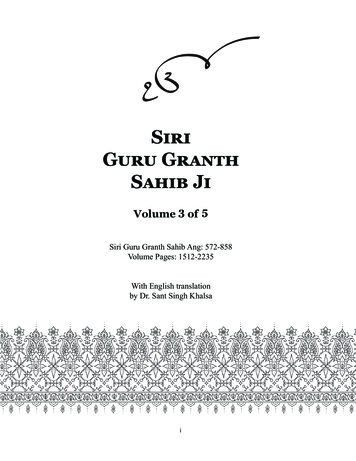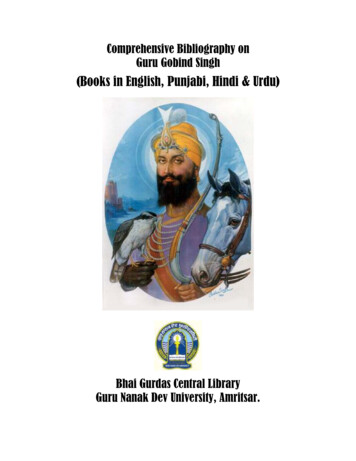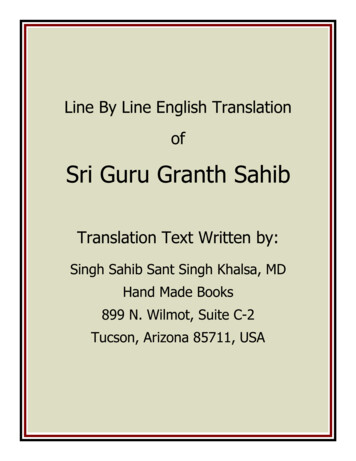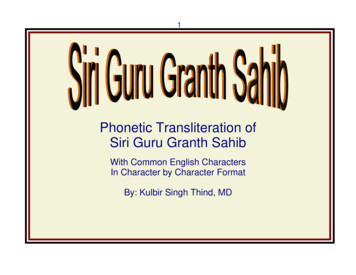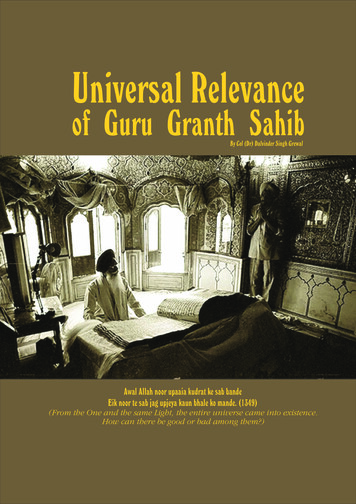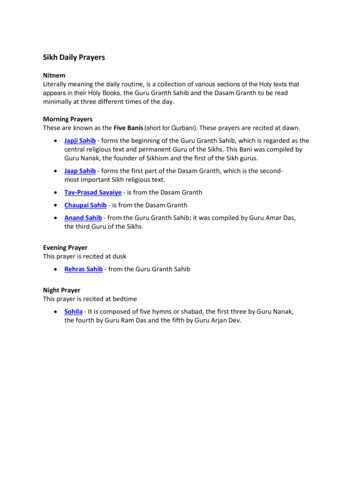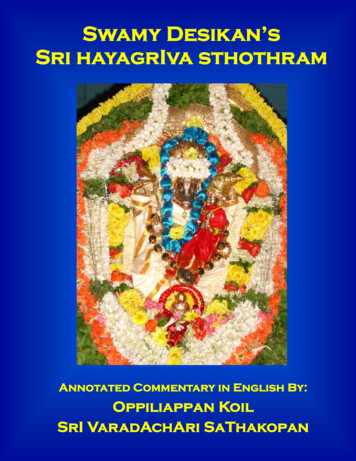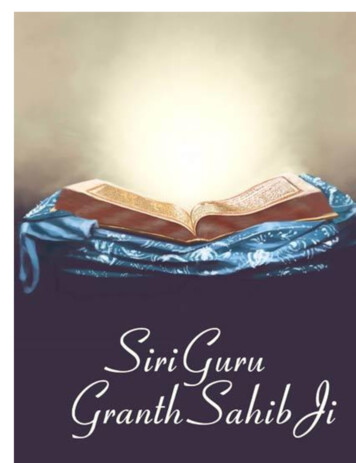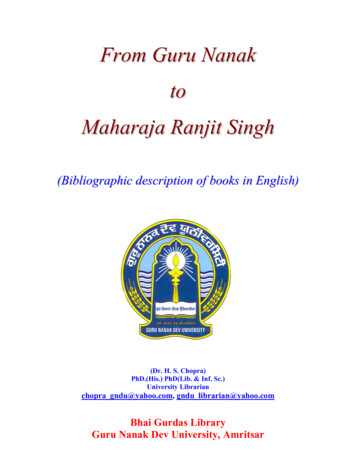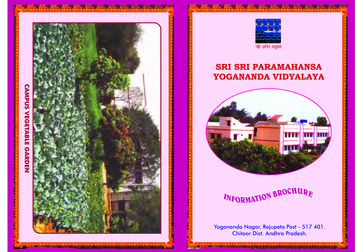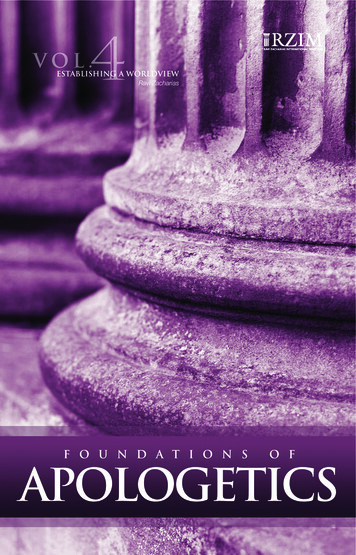
Transcription
It is the same lightthe enlightening wisdom ofSri Guru Granth Sahib(SGGS)an interpretation byDaljit Singh JawaVolume 4: SGGS(P 601-800)
Sri Guru Granth SahibDedicated to the loving memory of my parentsSARDAR HARI SINGH JAWA&SARDARNI KARTAR KAURwho provided an atmosphere in which their children could grow spirituallyIt is the same lightPage - 2 of 965
Sri Guru Granth SahibCopyright 2013 by Daljit Singh Jawa.All rights reserved. No part of this book may be reproduced or transmitted in any formor by any means, electronic or mechanical, including photocopying, recording, or byany information storage and retrieval system, without permission in writing from thecopyright owner.The transliteration used this volume was originally done by Dr. Kulbir Singh Thind,using a schematic developed by him.The author sincerely appreciates the services of Sikh Net, who have been tirelesslyworking on developing the web site and making available Gurbani in all its differentforms, languages, and fonts to the Gurbani lovers throughout the world.The author is very grateful to the management and staff of Jus Punjabi, and MagazineSikh Review for the publicity provided by them on the release of first volume.The author is very thankful to his friends Dr. Amarjit Singh of Buffalo, NY, Ms.Bhagwant Sekhon of Australia, S. Ravinder Singh Taneja of Sikh Research Institute,Mr. Phil Anderson of Topeka, Capital Journal, Prof. Barry Crawford of WashburnUniversity, and Jesse Schell of New Zealand for their review and helpful comments onthe first volume of this book.Rev. date: 07/18/2014To order additional copies of this book, contact:Xlibris Jawa222@gmail.comhttp://gurbaniwisdom.comIt is the same lightPage - 3 of 965
Sri Guru Granth SahibGLOSSARYOf Some Non English TermsWordApprox. MeaningAmritNectar, holy water used at the time of Sikhinitiation ceremonyStanzas with eight phrasesStanzas of four phrasesCouplets of two phrasesBeat for the musical measureHoly ScriptureGuru’s word (or composition)Spiritual Teacher, Sikh prophetWorldly riches and power, worldly attachment,worldly illusionTerm followed by a number indicating theGuru-who authored a particular hymn in SriGuru Granth SahibThe first Sikh GuruA stanza of five phrasesStep of a stair case, stanza in an epicMusical measureSuffix for RespectCouplet or short stanzaSound, word, hymnDisciple, Follower of SikhismPrefix for Respect, such as SirSikh Holy Scripture and eternal GuruA high spiritual state of mindEpic, a long poem with stanzas and PaurrisWondrous preceptor, ruMayaMehlaNanakPanchpadaPaurriRag, RaagSahibSalokShabadSikhSriSri Guru Granth Sahib (SGGS)TuryaVaarWaheguruIt is the same lightPage - 4 of 965
Sri Guru Granth SahibFOREWORDI.J. SinghProfessor EmeritusAnatomical SciencesNew York UniversitySikhism comes to us from history and the lives of the Founder-Gurus along withtheir writings; as also some selected compositions of saints and bards revered in that timeand culture.Many of these poets and bards, came from all castes and divisions of Hinduism,others were from Islam. In the Indian culture of the day, these men would never ever sittogether to share their beliefs and practices, nor break bread together, and absolutely wouldnot be caught on the adjoining pages of the same holy book. Yet that is exactly what theGuru Granth, the Sikh scripture does.When Guru Arjan compiled the first recension ofSikh scripture in 1604, he included the writings of Hindus – both of low castes and high –and also of Muslims. If Judeo-Christian scriptural writings had been freely available at thattime, I have little doubt that some would have found inclusion and commentary in thistome – the Adi Granth.Fully a century later, with minor modifications and the inclusion of the writingsof Guru Tegh Bahadur, the ninth Sikh Master, the living Word of the Adi Granth wasanointed as the Guru Granth (now respectfully referred as Sri Guru Granth Sahib). Threecenturies have now passed.Even though the northwest part of the Indian subcontinent is where they arose,historically Sikhs were never really limited to Punjab. The past century has seen large andsignificant Sikh communities in the United States, Canada and Great Britain, withimpressive pockets in much of the European Union, and also in East Africa and many partsof South East Asia.There is now a sea change in reality. There are generations of Sikhs being raisedoutside Punjabi ambience all across the world. Almost three million Sikhs now live outsidePunjab and India. Adding complexity to this narrative is the fact that Sri Guru GranthSahib was compiled in the language and the cultural context of the times, yet its messagespeaks across the bounds of time, geography, and culture.Guru Nanak, the Founder of the faith, was born in 1469. His writings form alarge corpus of the Guru Granth that was finalized by the tenth Master, Guru Gobind Singhin 1708. The script of Sri Guru Granth Sahib is the Guru-designed Gurmukhi; thelanguages used are many – the lexicon comes from most of the languages extant in India atthat time, including Arabic, Persian, the scholarly language of Sanskrit, the language ofpoetry Braj Bhasha and of course, Punjabi – the native language of Punjab, which itself isa fascinating mélange of the languages of the many invaders who found their way intoPunjab through the Khyber pass. These include the Caucasians and Greeks, as well aspeople from Iran, and what we now term the Middle East. There are many more.It is the same lightPage - 5 of 965
Sri Guru Granth SahibMuch of Sikh teaching, therefore, is cast in the metaphoric structure of Indicmythology. Not that this mythology is integral to the Sikh message, but the teaching has tobe in the contextual framework of the language, vocabulary and culture of the times. Onlythen can a student find meaning in it. The entire teaching is in the form of inspired, divinepoetry, and like all good poetry that is not doggerel, the reader needs to pause a moment tomake sense of the metaphoric language along with its many possible meanings andapplications. A literal rendering just will not do.Keep in mind that Sri Guru Granth Sahib deals with eternal themes that haveoccupied mankind forever, matters that we are seemingly hard wired for in our DNA: thesense of self, the nature of God and man and the relationship between them, the Creatorand Creation and mankind’s fragile but crucial place in it-- from which we then find waysto interpret life and death and principles by which to live and die. This is heavy-duty stuff– though we sometimes dismiss it simply as the “meaning of life” or the “MOL” momentthat every life has. The meaning is in the interpretation, and every generation has toexplore it anew. This also means that good people will fight over minutiae as well as differover the broader context.Obviously then, for a new generation of Sikhs growing up outside the culturaland linguistic milieu of Punjab and Punjabi language, discovering and nurturing a sense ofintimacy with the Guru’s message is not so simple a matter. I know of what I speak, forI’ve been there.This is exactly what Daljit Singh Jawa has to contend with. It is no easy task. It’sthe kind of work that no one can claim or hope to finish entirely. So Jawa has tried adifferent tack. He provides the original text (reproduced Dr. Kulbir Singh Thind’s seminalwork) in one column and in the next column he gives a transliteration of the original inRomanized script (schematically developed by Dr. Kulbir Singh Thind), so that the novicecan read the text reasonably competently.I have to add that this transliteration is easy on the eyes; it skips most diacriticalmarks and the bells and whistles that are so critical to a linguist. One could argue that itleaves the reader without the ability to read or mine the words for their exact meaning, butit helps the reader over the greatest of hurdles without the complexity of fine embroidery.This approach undoubtedly benefits the average reader and perhaps whets his/her appetiteto delve further into the intricacies of the language and that’s all to the good. And then theicing on the cake: Jawa reserves sufficient space on every page to provide not a literaltranslation of a hymn (shabad), but a conceptual statement of its essential message inserviceable English, often minus the mythological baggage. I find this an essential andmost attractive feature of Daljit Singh Jawa’s painstaking work.Many complete translations of Siri Guru Granth Sahib in English are available; Iknow of at least five, and many more translations of selected parts exist. There is noofficial, approved version. Personally, I like this. I celebrate them all. We may not alwaysagree with any one translation; I don’t, and hope that nor will you. What the manyviewpoints do is to propel you, the reader, on a path for yourself. And what can be betterthan that? This is a large canvas that Daljit Singh Jawa has painted. I hope readers willenjoy it as I have done – particularly the millions who now live outside Punjab and Punjabiambit and yet are intimately attached to or curious about the Sikh message.I.J. SinghJuly, 2014It is the same lightPage - 6 of 965
Sri Guru Granth SahibPREFACEAuthor Daljit Singh JawaDear Readers,This brief explanation of Sri Guru Granth Sahib is the author’s humble submission toyou after a continuous effort of more than nineteen years. Right at the outset, let meconfess that I am no scholar, and no literary figure, who could truly and accuratelytranslate, interpret, or explain what is written in the great scripture called Sri GuruGranth Sahib (SGGS). This is merely a modest attempt to address the need of thosereaders who want to understand, enjoy, and appreciate what is written in this holybook but being born and raised outside Punjab, India, are not familiar with thelanguage, culture, history or context in which SGGS was originally composed andwritten more than 500 years ago. The one message, which is both implicit, andexplicit in this holy scripture, and which the author particularly wants to share withthe rest of the world is that we have been all created by the same one Creator, and “Itis The Same Light” which pervades in us all. As such, we are the children of the sameparent. Therefore, we should all live like brothers and sisters, always loving eachother, and our Creator.The author is very much grateful to the great Punjabi and English translators whoseworks he consulted, and kept in front of him while completing this explanation. Theseeminent scholars include Dr. Sahib Singh, Gyani Harbans Singh, Dr. Bhai Vir Singh,Sardar Manmohan Singh, Dr. Gopal Singh, and S. Gurbachan Singh Makin. Inaddition the author is very grateful to all his family members, friends, and other wellwishers who have helped him in this effort.The author acknowledges the work done by S. Gurbaksh Singh Saggu of Patiala(India), for putting together the Gurmukhi text, and English transliteration of eachshabad in Sri Guru Granth Sahib from the Gurbani CD authored by Dr. Kulbir SinghThind, MD and its English interpretation by the author in its present printable form.In addition he wants to acknowledge his elder brother Dr. Manjit Singh Jawa, whometiculously read the English translation portion of the manuscript and suggestedmany needed corrections. The author also acknowledges, Miss Greta Pearl ofUniversity of Kansas for her editing work, and S. Ranbir Singh Kaberwal fordeveloping and maintaining the author’s website Gurbani wisdom.I hope the readers would find this work to be helpful in better understanding thedivine message, which the Sikh Gurus, great Hindu devotees, Muslim mystics, andother saints want to convey to us for the enrichment of our worldly life, and theeternal peace of our soul.Daljit Singh JawaJawa222@gmail.comJuly 2014It is the same lightPage - 7 of 965
Sri Guru Granth SahibCONTENTSVolume 4CompositionSub GroupPageSGGSPagevol. 4Rag 39It is the same lightPage - 8 of 965Pronunciation KeyRag SorathAshtpadianVaar Rag SorathBhagtan Di BaniRag DhanasriAshtpadianChhanttBhagtan Di BaniRag JaitsariChhanttVaar Rag JaitsariBhagtan Di BaniRag TodiBhagtan Di BaniRag BairarriRag TilangBhagtan Di BaniRag SoohiAshtpadianKuchajjiChhanttVaar Rag SoohiBhagtan Di Bani
Sri Guru Granth SahibKey to Pronunciation SymbolsGurmukhiCharactera,A,eSymbols used Examples of PronunciationforromanizationA, A, Eabut, ago, abroad, achieve,(a)adopt, agree, alone, bananaEoak, oath, oatmeal,shkAo(o)shkKkhggGerman ich, Buch (deeppalatal sound of k) Khaki (ayellowish color), Khomeni(Ayatula)go, big, gift, gag, gameGgh nycCchchhjJjjhchin, nature, churchSimilar to sh in shin, must belearntjob, gem, edge, join, judgeDeep labial sound of ‘j’\tnjtMust be learnt.tie, attack, tin, tap,TfthdFxqQdhntththug,did, adder, deed, dam,double,Deep palatal sound of ‘d’Must be learnt.Must be learnt.thin, thick, three, ether,It is the same lightsource, less, simple, somehat, head, hand, happykin, cook, ache, kick, catDeep palatal sound of ‘g’something like in ghostMust be learnt.Page - 9 of 965
Sri Guru Granth SahibdDndDhnpPpfbbBmbhmXryryard, young, unionred, car, rarity, roselvlvlily, pool, lid, needle, lambvivid, give, liveVrhSsh Zz&LHkhgzflH@Hçch†tœt nDeep palatal sound of ‘r’(must be learnt)shy,mission,machine,specialDeep palatal sound of ‘kh’Deep palatal sound of ‘g’zone, raise, zebra, xylemDeep labial sound of ‘f’Deep palatal sound of ‘l’Same as ‘h’ but of shortdurationSame as ‘h’ but of shortdurationSame as ‘ch’ but of shortdurationSame as ‘t’ but of shortdurationSame as ‘t’ but of shortdurationSame as ‘n’ but of shortdurationIt is the same lightthe, then, either, this, thereDeep labial sound of 'the'no, own, sudden, nib,pepper, lip, pit, paperfifty, cuff, phase, rough, fit,foot, furbaby, rib, bib, button,Deep palatal sound of ‘b’mum, murmur, dim, nymphPage - 10 of 965
Sri Guru Granth Sahib yRÍR(r)vwaaSame as ‘y’ but ofshort durationSame as ‘r’ but of shortdurationSame as ‘v’ but of shortdurationbother, cot, father, cart, palmWiaaNiThis adds nasal tone to ‘aa’tip, banish, active, pit, it, giveIueeuUooNose bleed, bee, feed, beat,bull, pull, full, cure hood,bookcool, pool, boot, tool, ruleyayray, say, day, hay, bayYaioomat, map, bad, lad, glad, rat,bat,bone, know, toe, note, goOouout, pound, now, loudNNMN or Mindicates that a precedingvowelordiphthongispronounced with the nasalpassages open, as in Frenchun bon vln blancindicates that a precedingvowelordiphthongispronounced with the nasalpassages open, as in Frenchun bon vln blancIt is the same lightPage - 11 of 965
Sri Guru Granth Sahib Page - 601pMnw 601SGGS P-601soriT mhlw 3 ]sorath mehlaa 3.hir jIau quDu no sdw swlwhI ipAwryijcru Gt AMqir hY swsw ]ieku plu iKnu ivsrih qU suAwmI jwxaubrs pcwsw ]hm mUV mugD sdw sy BweI gur kY sbidpRgwsw ]1]har jee-o tuDh no sadaa saalaaheepi-aaray Jichar ghat antar hai saasaa.ik pal khin visrahi too su-aamee jaana-obaras pachaasaa.ham moorh mugaDh sadaa say bhaa-eegur kai sabad pargaasaa. 1 hir jIau qum Awpy dyhu buJweI ]hir jIau quDu ivthu vwirAw sd hI qyrynwm ivthu bil jweI ] rhwau ]har jee-o tum aapay dayh bujhaa-ee.har jee-o tuDh vitahu vaari-aa sad heetayray naam vitahu bal jaa-ee. rahaa-o.hm sbid muey sbid mwir jIvwly BweIsbdy hI mukiq pweI ]ham sabad mu-ay sabad maarjeevaalay bhaa-ee sabday hee mukatpaa-ee.sabday man tan nirmal ho-aa harvasi-aa man aa-ee.sabad gur daataa Jit man raataa harsi-o rahi-aa samaa-ee. 2 sbdy mnu qnu inrmlu hoAw hir visAwmin AweI ](sbdu gur dwqw ijqu mnu rwqw hir isaurihAw smweI ]2]sbdu n jwxih sy AMny boly sy ikqu AweysMswrw ](hir rsu n pwieAw ibrQw jnmugvwieAw jMmih vwro vwrw ]ibstw ky kIVy ibstw mwih smwxy mnmuKmugD gubwrw ]3]sabad na jaaneh say annay bolay saykit aa-ay sansaaraa.har ras na paa-i-aa birthaa janamgavaa-i-aa jameh vaaro vaaraa.bistaa kay keerhay bistaa maahisamaanaymanmukhmugaDhgubaaraa. 3 Awpy kir vyKY mwrig lwey BweI iqsu ibnuAvru n koeI ]jo Duir iliKAw su koie n mytY BweI krqwkry su hoeI ]nwnk nwmu visAw mn AMqir BweI Avrun dUjw koeI ]4]4]aapay kar vaykhai maarag laa-ay bhaaee tis bin avar na ko-ee.jo Dhur likhi-aa so ko-ay na maytaibhaa-ee kartaa karay so ho-ee.naanak naam vasi-aa man antarbhaa-ee avar na doojaa ko-ee. 4 4 It is the same lightPage - 12 of 965
Sri Guru Granth Sahib Page - 601Sorath Mehla-3Chaupada- 4-16In paragraph 2 of the previous shabad, Guru Ji stated: “(O’ my friends), by praising(God) through the word (of the Guru), I obtain (spiritual) life and through Guru’sinstruction (my worldly) fear has vanished. My God is eternal and very handsome.The one who serves (and follows the advice of) the Guru, that one’s mind getsattached (to God. The one in whose mind is enshrined) the eternal word (or Name ofGod) and the eternal word (of the Guru), day and night that one remains awake (andalert to the worldly temptations).” Therefore, in this shabad, even for himself Guru Jiprays to God to bless him, that he may always keep meditating on His Name andsinging His praise. He also recognizes that meditation upon God’s Name is notpossible, without first reflecting on the Guru’s word and following his advice.Guru Ji says: “O' my God, (bless me), that I may always praise You as long as there isbreath in my body. Because, O’ Master, even if You are forsaken for a moment, Ideem it (as if) fifty years have passed. O’ my brothers (and sisters), forever we havebeen ignorant fools, and only through the word of the Guru, the light (of divinewisdom) has become manifest in us.” (1)Therefore addressing God, he says: “O' my beloved God, You Yourself please makeme understand (the way to meditate on Your Name). O' my dear God, I am always asacrifice to You and I am a sacrifice to Your Name.”(1-pause)Now, as if sharing with someone how he achieved his present state, Guru Ji says: “O’my brother, it was through the word (of the Guru, that I became detached fromworldly involvements, as if to the world) I had died; yes, it was the word (of the Guru,which has kind of made me) dead (to the world) and then rejuvenated me (to the newspiritual life). It was also through the (Guru's) word that I obtained salvation (fromworldly attachments). It is through the (Guru's) word that my mind and body hasbecome immaculate, and God has come to abide in my mind. (O’ my friends), theGuru's shabad (of advice) is the giver, with which my mind has been imbued and hasremained merged in God.”(2)Therefore, commenting on the state and fate of those self-conceited persons who donot care for the Guru's word, he says: “(O’ my friends, they who do not realize thevalue of the Guru’s) word are like dumb and blind persons; (I wonder), why have theycome to this world (at all)? They never obtained the relish of God, (therefore) theyhave wasted their life in vain and will keep going through births and deaths again andagain. They are like the worms of filth, and the totally blind and self-conceitedpersons are consumed in that very filth.”(3)Guru Ji concludes the shabad by once again addressing his friend. He says: “O' mybrother, God Himself sees what He has done and then He Himself guides somepersons on the right path; and there is none other who can do that. Whatever has beenwritten in the destiny of a person from the very beginning, nobody can erase that;It is the same lightPage - 13 of 965
Sri Guru Granth Sahib Page - 601whatever the Creator wills happens. In short, O’ my brother, (I) Nanak submit thatwhen God is enshrined in the mind, (then one realizes that there is none other (likeHim).”(4-4)The message of this shabad is that even while talking to other persons aboutvirtuous things, we should keep praying to God to help us utter the right words,and we should be so much in love with Him that even a moment’s separationshould appear to us a very long, unbearable period.soriT mhlw 3 ]sorath mehlaa 3.gurmuiK Bgiq krih pRB Bwvih Anidnunwmu vKwxy ]Bgqw kI swr krih Awip rwKih jo qyrYmin Bwxy ]qU guxdwqw sbid pCwqw gux kih guxIsmwxy ]1]gurmukh bhagat karahi parabh bhaavehan-din naam vakhaanay.bhagtaa kee saar karahi aap raakhahi jotayrai man bhaanay.too gundaataa sabad pachhaataa gunkahi gunee samaanay. 1 mn myry hir jIau sdw smwil ]AMq kwil qyrw bylI hovY sdw inbhY qyrYnwil ] rhwau ]man mayray har jee-o sadaa samaal.ant kaal tayraa baylee hovai sadaanibhai tayrai naal. rahaa-o.dust caukVI sdw kUVu kmwvih nw bUJihvIcwry ]inMdw dustI qy ikin Plu pwieAw hrxwKsnKih ibdwrypRihlwdu jnu sd hir gux gwvY hir jIauley aubwry ]2]dusatcha-ukarheesadaakoorhkamaaveh naa boojheh veechaaray.nindaa dustee tay kin fal paa-i-aaharnaakhas nakheh bidaaray.par-hilaad jan sad har gun gaavai harjee-o la-ay ubaaray. 2 (Awps kau bhu Blw kir jwxih mnmuiKmiq n kweI ]swDU jn kI inMdw ivAwpy jwsin jnmugvweI ]rwm nwmu kdy cyqih nwhI AMiq geypCuqweI ]3]aapas ka-o baho bhalaa kar jaanehmanmukh mat na kaa-ee.saaDhoo jan kee nindaa vi-aapay jaasanjanam gavaa-ee.raam naam kaday cheeteh naahee antga-ay pachhutaa-ee. 3 sPlu jnmu Bgqw kw kIqw gur syvw Awiplwey ]sbdy rwqy shjy mwqy Anidnu hir guxgwey ]nwnk dwsu khY bynμqI hau lwgw iqn kYpwey ]4]5]safal janam bhagtaa kaa keetaa gursayvaa aap laa-ay.sabday raatay sehjay maatay an-din hargun gaa-ay.naanak daas kahai baynantee ha-olaagaa tin kai paa-ay. 4 5 It is the same lightPage - 14 of 965
Sri Guru Granth Sahib Page - 601Sorath Mehla-3Chaupada- 5-17In paragraph (2) of the previous shabad, Guru Ji told us that it was through the word(of the Guru that he became so detached from worldly involvements, as if for theworld) he had died and then was rejuvenated (to the new spiritual life) through theword. It was through the (Guru's) word that his mind and body became immaculate,and God came to abide in his mind. In this shabad, Guru Ji depicts the conduct of theGuru’s followers and also describes the state and fate of those self-conceited personswho do not care for the Guru’s word and follow the dictates of their own minds.He says: “(O' my friends), the Guru’s followers, always worship God by meditatingon His Name, and they look pleasing to God. (O’ God), You take care of the devoteesand save those who are pleasing to You. You are the giver of merits; it is through theword (of the Guru) that Your devotees have recognized You. It is by describing Yourmerits that (the devotees) remain merged in You, the possessor of merits.”(1)Addressing his mind once again, Guru Ji says: “O' my mind, always remember thatloving God, so that at the time of your death, He may be your friend and mate andaccompany You forever.”(1-pause)Now Guru Ji comments on the conduct of the company or the gangs of some selfconceited wicked persons. He says: “The gangs of evil persons always earn falsehood;they never reflect and realize that nobody has obtained any peace through wickednessor slander. (They even forget, that God) tore apart the king Harnakash with His nailsand He saved His devotee Prehlaad, who was always singing His praise.”(2)Commenting further on the conduct and fate of self-conceited persons), Guru Ji says:“(The self-conceited persons), always think themselves as very virtuous, but theseself-conceited persons have no wisdom at all. They indulge in the slander of saintlypeople, so they will depart from here having wasted their lives. They never rememberGod's Name, therefore, in the end they would depart from this world repenting andgrieving”(3).In conclusion, Guru Ji states: “(O’ my friends, God) has rendered fruitful the life ofHis devotees, and He Himself has yoked them to the service of the Guru. Beingimbued with the (Guru's) word and remaining absorbed in a state of peace and poise,they sing praises of God day and night. Servant Nanak submits this prayer, that mayhe touch the feet of such devotees (of God and most humbly serve them)”(4-5)The message of this shabad is that we should always avoid the company of thefalse, self-conceited persons and we should be imbued in the love of God's Name,which would be our helper and savior in the end.It is the same lightPage - 15 of 965
Sri Guru Granth SahibPage - 602soriT mhlw 3 ]so isKu sKw bMDpu hY BweI ij gur ky Bwxyivic AwvY ]AwpxY BwxY jo clY BweI ivCuiV cotw KwvY]ibnu siqgur suKu kdy n pwvY BweI iPiriPir pCoqwvY ]1]sorath mehlaa 3.so sikh sakhaa banDhap hai bhaa-ee jegur kay bhaanay vich aavai.aapnai bhaanai jo chalai bhaa-eevichhurh chotaa khaavai.bin satgur sukh kaday na paavaibhaa-ee fir fir pachhotaavai. 1 hir ky dws suhyly BweI ]har kay daas suhaylay bhaa-ee.pMnw 602SGGS P-602jnm jnm ky iklibK duK kwty Awpy myilimlweI ] rhwau ]janam janam kay kilbikh dukh kaatayaapay mayl milaa-ee. rahaa-o.iehu kutMbu sBu jIA ky bMDn BweI BrimBulw sYNswrw ]ibnu gur bMDn tUtih nwhI gurmuiK moKduAwrw ]krm krih gur sbdu n pCwxih mirjnmih vwro vwrw ]2]ih kutamb sabh jee-a kay banDhanbhaa-ee bharam bhulaa saiNsaaraa.bin gur banDhan tooteh naaheegurmukh mokh du-aaraa.karam karahi gur sabad na pachhaanehmar janmeh vaaro vaaraa. 2 hau myrw jgu plic rihAw BweI koie niks hI kyrw ]gurmuiK mhlu pwiein gux gwvin injGir hoie bsyrw ]AYQY bUJY su Awpu pCwxY hir pRBu hY iqsukyrw ]3]ha-o mayraa jag palach rahi-aa bhaa-eeko-ay na kis hee kayraa.gurmukh mahal paa-in gun gaavan nijghar ho-ay basayraa.aithai boojhai so aap pachhaanai harparabh hai tis kayraa. 3 siqgurU sdw dieAwlu hY BweI ivxu BwgwikAw pweIAY ]eyk ndir kir vyKY sB aUpir jyhw Bwauqyhw Plu pweIAY ]nwnk nwmu vsY mn AMqir ivchu AwpugvweIAY ]4]6]satguroo sadaa da-i-aal hai bhaa-ee vinbhaagaa ki-aa paa-ee-ai.ayk nadar kar vaykhai sabh ooparjayhaa bhaa-o tayhaa fal paa-ee-ai.naanak naam vasai man antar vichahuaap gavaa-ee-ai. 4 6 Sorath Mehla-3Chaupada- 6-18Oftentimes, there is a hot discussion and debate among many persons regarding whois a true sikh or disciple of the Guru. All give their own definitions, according to whatIt is the same lightPage - 16 of 965
Sri Guru Granth Sahib Page - 602suits their own style or way of living. Some say only those who have been baptized, ortaken Amrit, are the Sikhs. Others claim Amrit is not necessary, just living a truthfullife without hurting others makes one a good Sikh. Still others think that simply bybeing born in a sikh family one becomes a sikh and nothing else matters. Guru Jibegins this shabad by giving the definition of a (true) Sikh, and tells us what kind ofblessings, such a person obtains who meets this definition, and what kinds of pain andsuffering that person goes through whose conduct is otherwise.He says: “O’ brothers (and sisters), that person is (a true) “Sikh”, friend and kin, whosubmits to the Guru’s will (and conducts his life in accordance with Guru’s guidance.But) O’ brothers (and sisters), the one who acts in accordance with one’s own will (orego), that one gets separated (from God) and suffers blows (of fate). In short, without(following the guidance of) the true Guru, one never obtains peace and repents againand again.”(1)Describing briefly the kind of peace the devotees obtain, Guru Ji says: “(They whofollow Guru’s advice become like servants of God, and) O’ brothers (and sisters), theservants of God are (always) in peace. (Because) on His own (God) has brought abouttheir union with Him (through the Guru, and He has) washed off their pains and sins,(accumulated by them) birth after birth.”(1-pause)Explaining why it is necessary to follow Guru’s advice, and what kinds of sufferingsand pains a person suffers who only keeps doing the worldly tasks without caring forGuru’s advice, he says: “O’ my brothers (and sisters, without following Guru’sguidance), this family of ours also becomes like bonds for our soul, and (that is whythe entire) world remains lost in doubt. Without the guidance of the Guru these bondscannot be broken lose, but the one who follows Guru’s advice, that one finds the wayof liberation (from the worldly bonds. On the other hand, they who keep doing(worldly) tasks, but don’t act on the Guru’s words (of advice) keep on dying andbeing born again and again.”(2)Commenting further on the state of the world and why it keeps suffering while theGuru’s followers live in a state of stability in the company of God, Guru Ji says: “O'brothers (and sisters), the world is caught in selfishness and ego, and no one (truly)cares for any other. But they who follow Guru's advice, by singing (God’s) praisesthey live in the presence of God, and abide in their own home (of the heart, or themansion of God). The person who in this (world) realizes his or her self, (and keepsexamining the self), God remains that person’s helper throughout.”(3)Guru Ji concludes the shabad by answering the question: “The Guru is gracious on all,then why some do not receive his grace while others do?” He says: “O' my brothers(and sisters), the true Guru is always merciful (on everybody), but without destiny,what could we obtain? He sees everybody with one sight and showers his grace oneverybody. However, whatever is the attitude of a person (towards the Guru, thatperson) obtains the fruit accordingly. (It is just like that even though rain falls all overthe area, but still only the fields, which have been leveled and prepared properlyreceive the benefit of this rain, but the sand dunes and hillocks don’t benefit from it,It is the same lightPage - 17 of 965
Sri Guru Granth Sahib Page - 602because all the rain water is washed off. In short), O’ Nanak, only when we still ourego from within, that (God’s) Name is enshrined in our mind.”(4-6)The message of this shabad is that they who follow the will and desire of theGuru, remain happy and peaceful, but they who follow their own self-conceit,repent and grieve and are subjected to the pains of birth and death again andagain.soriT mhlw 3 cOquky ]sorath mehlaa 3 choutukay.scI Bgiq siqgur qy hovY scI ihrdY bwxI ]siqguru syvy sdw suKu pwe
Sri Guru Granth Sahib It is the same light Page - 7 of 965 PREFACE Author Daljit Singh Jawa Dear Readers, This brief explanation of Sri Guru Granth Sahib is the author’s humble submission to you after
